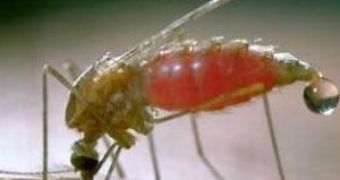"Mosquitoes' thirst for sugar could prove to be the answer for eliminating malaria and other mosquito-transmitted diseases," says Hebrew University researcher Prof. Yosef Schlein.
Female mosquitoes need to feed on blood to produce eggs, but few know they need sugar between their bloody meals. The sugar is achieved from nectar from flowers or juices on plant leaves and stems. The scientists sprayed acacia trees in a oasis in southern Israel with a sugar solution that had been mixed with the oral insecticide Spinosad. The few acacia trees scattered through the oasis flowered most of the year, including during a long, dry season. In the absence of other sugar sources, the female mosquitoes turned to the acacia trees.
The oasis chosen for this experiment is isolated and the experiment could be carried out without influx and exchange of mosquitoes from other areas. The spraying eliminated almost the entire mosquito population in the oasis.
The few individuals trapped after spraying seemed to be newly emerging adults and population growth was stopped by continuous effect of the insecticide. Few spraying wiped out the mosquito population from the oasis. This method works in arid areas where few sparse trees or bushes are the only sugar source for mosquitoes. But even when a larger variety of flowers is available, studies proved that mosquitoes preferred certain species.
In Wisconsin, mosquitoes concentrated on four amongst 77 flowering plants. These favorite plants could be chosen to be sprayed with the Spinosad-sugar solution. Spinosad is a mild oral insecticide with little effect on several insect groups, and mildly toxic to vertebrates.
In arid and semiarid areas in sub-Saharan Africa, where malaria incidence is increasing due to environmental changes, drug resistance of the parasite and mosquito's resistance to conventional insecticides is a key solution that must be verified. Large-scale irrigation projects in arid and semiarid areas may see a boom of mosquito's populations, like a large chunk of Africa or Pakistan. Irrigated crops, such as rice, do not deliver any sugar source for the mosquitoes and the surroundings present scarce food opportunities. Planting trees or bushes nearby, sprayed with oral insecticide, could be a quick, easy and cheap way to fight against mosquito transmitted diseases.

 14 DAY TRIAL //
14 DAY TRIAL //